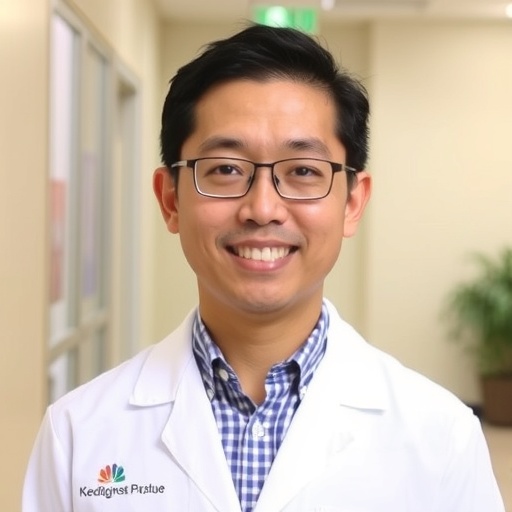In a transformative leap for critical care medicine, Dr. Dong Chang, an esteemed investigator at The Lundquist Institute’s Division of Respiratory and Critical Care Medicine, has secured a landmark $3.16 million R01 grant from the National Institutes of Health (NIH)/National Institute on Aging. This significant funding is propelling an advanced study aimed at reducing the prevalence of potentially non-beneficial treatments in intensive care units (ICUs) for patients enduring advanced medical illnesses. This project, titled “A Type 2 Hybrid Effectiveness-Implementation Study of Time-Limited Trials to Reduce Potentially Non-Beneficial Treatments for Critically Ill Patients with Advanced Medical Illnesses,” embarks on a mission to revolutionize patient care through enhanced communication and innovative treatment protocols.
The initiative commenced on September 25, 2025, ushering in a new era for both Dr. Chang and The Lundquist Institute. This award reflects a deep institutional commitment to excellence in health services research, particularly focusing on outcomes that prioritize both the quality and humanity of care within critical care settings. The grant underscores the increasing recognition within the scientific community of the urgent necessity to optimize ICU care, especially for vulnerable patient populations often subjected to invasive procedures with questionable benefit.
One of the pivotal challenges the project addresses is the substantial overuse of invasive ICU interventions among patients with advanced illnesses. Current statistics illustrate that many critically ill patients receive aggressive treatments that may offer little to no meaningful clinical benefit, frequently resulting in prolonged suffering rather than enhanced survival or quality of life. This scenario often emerges due to significant communication gaps among healthcare providers, patients, and their families regarding treatment goals and expectations.
Dr. Chang’s groundbreaking contribution lies in the structured communication strategy he and his team have meticulously developed. This strategy harnesses the power of shared decision-making models combined with Time-Limited Trials (TLT) of ICU treatments. TLTs serve as a mechanism to establish agreed-upon treatment goals, define explicit timeframes for interventions, and mandate systematic reassessment of patient status and therapeutic efficacy. These trials encourage transparent dialogue and collaborative decision-making between healthcare providers, patients, and families, fostering an environment of shared understanding and mutual respect.
In pilot investigations, the application of TLTs demonstrated remarkable improvements in communication quality, as well as a noticeable reduction in the utilization of non-beneficial treatments. Patients and families were better informed and more actively engaged in determining care trajectories that aligned with their values and preferences. These preliminary successes set a strong foundation for the current large-scale, pragmatic clinical trial funded by the NIH R01 grant.
This ambitious trial will be conducted across two of the most expansive and diverse healthcare systems in the United States: the Los Angeles County Department of Health Services (LAC DHS) and Kaiser Permanente Southern California (KPSC). LAC DHS, the second-largest public healthcare system nationwide, and KPSC, boasting the largest integrated healthcare framework in Southern California, present ideal environments for evaluating the efficacy and implementation of TLT methods within varying institutional cultures and patient demographics.
By deploying TLTs in these heterogeneous contexts, Dr. Chang’s research aims to decipher how ICU care can be nuanced to honor diverse cultural, social, and economic circumstances. This aspect is crucial given the healthcare disparities that often affect critically ill patients, particularly those hailing from underrepresented communities. The trial’s outcomes could illuminate pathways toward more equitable and patient-centered critical care delivery models on a national scale.
Beyond the direct clinical implications, the project represents a sophisticated blend of scientific rigor and compassionate care principles. It embodies a paradigm shift, where patient autonomy and clinical judgment synergize to curtail interventions that lack efficacy while promoting humane, dignity-preserving treatment frameworks. The emphasis on real-world implementation bridges the oft-seen gap between clinical research and everyday practice, ensuring that findings translate into tangible improvements for ICU patients.
Dr. Chang’s work exemplifies an emerging trend in critical care research focusing on pragmatic interventions that account for complexity, system dynamics, and multi-stakeholder engagement. The ability to adapt clinical protocols to real-world settings without compromising scientific integrity is paramount to evolving health services that are both effective and sustainable.
As this study progresses, it is poised to generate invaluable data on the interplay between communication dynamics, care decision-making, and the utilization patterns of invasive ICU therapies. The potential ripple effects include refining national guidelines, informing policy reforms, and fostering a culture shift towards more judicious use of critical care resources.
The Lundquist Institute’s endorsement of Dr. Chang’s research enhances its reputation as a beacon of innovation in health services outcomes research. By securing this highly competitive NIH grant, Dr. Chang and his collaborators have positioned themselves at the forefront of efforts to reconcile the demands of cutting-edge medicine with the imperatives of patient-centered care in complex, high-stakes clinical environments.
Ultimately, this pioneering project envisions a future where critically ill patients and their families are empowered partners in care decisions, where treatment pathways are aligned with realistic outcomes, and where the technology and capabilities of modern ICUs are harnessed thoughtfully to maximize benefit and minimize harm. The ripple effects of this research may well redefine standards of ICU care and shared decision-making protocols across the healthcare spectrum in the years to come.
Subject of Research: Health Services Research focused on ICU care communication strategies and implementation of Time-Limited Trials (TLTs) to reduce non-beneficial treatments for critically ill patients with advanced medical illnesses.
Article Title: A Type 2 Hybrid Effectiveness-Implementation Study of Time-Limited Trials to Reduce Potentially Non-Beneficial Treatments in ICU Patients
News Publication Date: Not explicitly stated (Project commencement date: September 25, 2025)
Web References:
– https://lundquist.org/profile/dong-chang-md-ms/
Image Credits: Rafael from The Light Committee
Keywords: Communications, Health Services, Critical Care, ICU, Shared Decision-Making, Time-Limited Trials, Medical Ethics, Health Disparities, Patient-Centered Care




